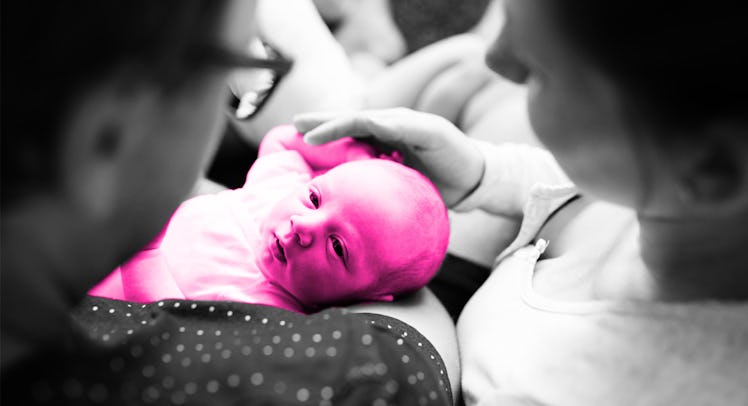How to Keep Babies Safe From Getting Sick During Flu Season
Influenza is a serious threat to infants. Parents need to take precautions.

Flu season comes in like a lion and goes out like a lion calling in sick. For new parents, it’s a fraught time of year because the disease is especially dangerous for infants and there are no flu shots for babies under 6 months of age. The result? In searching for answers to how to keep an infant safe from the flu, moms and dads jettison their social calendars and adopt an unsustainable defensive posture while hoping and praying they can keep diseases at bay. (Of course, this year you’re probably doing that for COVID and RSV already anyway.) Luckily, you may be able to keep the flu at bay if you adopt certain precautions.
“Newborns, or babies under two months of age, should be kept away from crowds of people as much as possible,” says Tanya Altmann, MD, a pediatrician in California and author of Baby and Toddler Basics. “Under two months of age, they don’t really have a well-developed immune system yet, and they can get very sick very quickly.”
Once babies have reached six months or so, they can receive the flu vaccine, although the first vaccination requires two doses administered a month apart. They may experience the typical side effects of vaccination — muscle soreness, fussiness, even a low-grade fever — but these are short-term and well worth the added protection the flu vaccination offers. No flu vaccine offers 100 percent protection, but they do minimize symptoms if you get the flu and can prevent secondary infections like pneumonia. Parents can also boost their child’s immune system in other ways — via breastfeeding (if that’s an option) or skin-to-skin contact.
How to Keep an Infant Safe from the Flu
- Two Months Old and Younger: Take extra care with very small babies; the diagnostic workup for a fever can be invasive.
- Avoid Crowds and Daycare: Too many people – particularly too many toddlers, with their lax hygiene standards – can introduce some very nasty bugs to a newborn’s very new immune system.
- Hygiene for Everyone!: Parents, grandparents, siblings, visitors – everybody washes hands, everybody takes shoes off, everybody changes clothes if practical, and nobody kisses the baby. Wearing masks can also help prevent the spread of the flu and COVID.
- Keep Symptoms Away: If family members or guests present symptoms, keep them away from the baby.
- Get Vaccinated: Anyone in the household who is old enough for the flu shot should get it. While they’re at it, they should get the COVID vaccine too. Babies can get the flu shot starting at six months of age.
- Boost the Baby’s Immune System: Breastfeed if possible. If not, go all in on skin-to-skin contact.
- When Concerned, Talk to a Doctor: Calling them on the phone works, but parents needn’t be shy about going in.
Preventing the Flu in Babies
Influenza can be very rough on an infant under two months old, and not necessarily because of the symptoms. Even getting to a diagnosis, it turns out, can be rough in its own right. The flu isn’t the only player in town. COVID, RSV, colds, and other viruses can compromise a baby’s breathing. “If there is a fever or a sign of infection, we do a pretty comprehensive workup,” Altmann says. “It involves drawing blood, putting catheters in and doing x-rays, just because we want to make sure where that fever is coming from.”
Regular sleep and good nutrition are also important. If the baby is on solid foods, fresh fruits and vegetables and good protein choices can also boost their immune performance.
Keeping babies away from crowds doesn’t mean keeping them in a bubble — with the right precautions, it’s okay to take them outside to enjoy the world. Particularly, the outdoors is safer for both the flu and COVID. And, of course, keeping an infant at home isn’t a sure thing, either. Play areas, daycares, and schools tend to harbor all sorts of nasty bugs, and older siblings are going to bring those bugs home with them.
But there are ways to reduce that risk. And that starts with thinking about what other people, specifically older kids, are bringing into your home. First of all, those older siblings should be wearing masks outside the home. When they get home, they should enter baby safety mode.
“What I usually do is try to have those toddlers and preschoolers change their clothes and wash their hands when they get home,” Altmann says. “Then I teach them to kiss the top of the baby’s head, instead of the hands or the feet, because babies are always putting their hands and feet in their mouth.”
What to Do When Your Baby Catches the Flu
Chances are, despite parents’ best efforts, that older sibling is going to catch a cold or the flu. In such cases, parents can still protect newborns or infants by keeping them in quarantine. The sick kid stays out of the baby’s play area, and the baby – well, the baby can’t really go anywhere. Some 1-year-olds may be moving around the house, but they can still be stymied by baby gates. And even babies as young as two months can take modified doses of Tamiflu after they have been exposed and are just starting to present symptoms. They’ll need to be closely monitored, however.
“If your child does get a fever, runny nose, or a cough, it’s important to know the signs that you do need to see your pediatrician,” Altmann says. “Any trouble breathing, decreased fluid intake, fewer wet diapers, or anything you are nervous about or uncomfortable, make sure you have your baby checked by the pediatrician.”
This article was originally published on